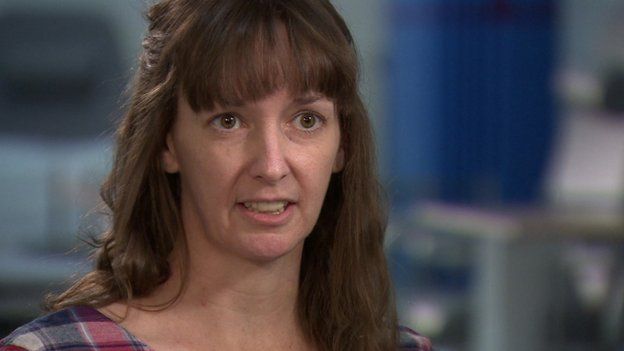Ebola nurse infection 'down to visor'
- Published

The UK nurse Pauline Cafferkey probably caught Ebola by wearing a visor instead of goggles while treating patients, an investigation has concluded.
The report by Save the Children says it is impossible to be completely certain how she caught the virus.
However, it said the different safety protocols used for removing visors and goggles, was the most likely explanation.
Ms Cafferkey made a full recovery after being treated in London.
An independent panel, led by Public Health England, reviewed the case.
'Uncertain'
Justin Forsyth, the chief executive of Save the Children, said: "We will never be 100% sure how Pauline contracted Ebola, but the independent panel found that it is most likely, though not conclusive, she acquired her illness while working at the Ebola Treatment Centre at Kerry Town in Sierra Leone.
"Working under such intense and challenging conditions, however, cannot be without risk.
"Although there is no conclusive evidence, the panel suggests that Pauline's use of a visor, within a context geared to the use of goggles, was the most likely cause of her contracting Ebola."
Visors are recommended by the World Health Organization, and are used by the UK Ministry of Defence.
Save the Children uses goggles.
The full report said both options were equally safe. However, there are key differences in the way the different types of protective equipment are safely removed.
Ms Cafferkey had been trained to use a visor before being re-deployed to the Save the Children centre, but was not able use their goggles "because she could not get them to fit properly," the report said.
Mr Forsyth said 'action might not have been taken quickly' enough to identify any problems.
But he said lessons have been learned.
Recovery
Speaking after being discharged from the Royal Free Hospital, in London, Ms Cafferkey, from Cambuslang, in South Lanarkshire, thanked staff who she said had saved her life.
She told the BBC: "I am just happy to be alive. I still don't feel 100%, I feel quite weak, but I'm looking forward to going home."
However, she said she was "definitely frightened" having witnessed the virus first hand in Sierra Leone.
"Obviously at the back of my mind I had seen what could happen and what could potentially happen to me."
Ms Cafferkey was treated with blood plasma from an Ebola survivor and an experimental treatment drug closely related drug to ZMapp, which UK nurse Will Pooley was treated with after he contracted Ebola.